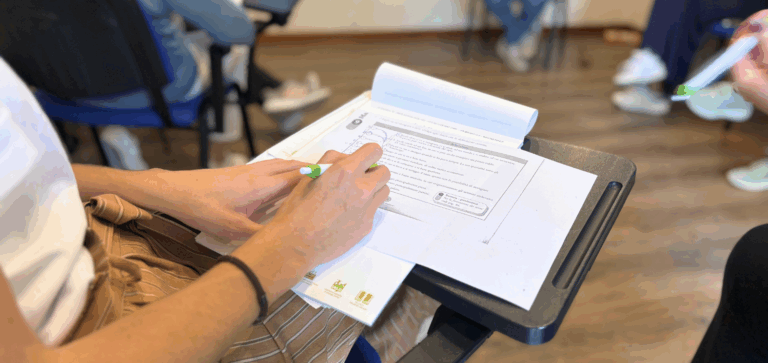Prepare for CELI B1 to prove your ability to handle everyday interactions and basic professional communication in Italian. Recognized internationally and accepted for purposes like citizenship applications, the CELI (Certificato di Conoscenza della Lingua Italiana) is issued by the University for Foreigners of Perugia and assesses your Italian language skills across different levels. B1 corresponds to an intermediate level of language proficiency, and the CELI exam for this stage is known as CELI 2.
How can you best prepare for CELI B1? Let’s explore practical strategies, resources, and tips to help you approach the exam with confidence.

Understand the exam format
First, it’s essential to know what you’ll face on exam day. The CELI 2 consists of five parts:
- Listening (Comprensione dell’ascolto): You’ll listen to short conversations, announcements, or messages and answer related questions.
- Reading (Comprensione della lettura): You’ll read various texts, letters, advertisements, articles and answer multiple-choice or open-ended questions.
- Writing (Produzione scritta): You’ll write short texts such as emails, letters, or simple compositions on everyday topics.
- Speaking (Produzione orale): A short interview where you discuss familiar topics, express opinions, and answer questions.
- Language competence (Competenza linguistica): Grammar and vocabulary exercises to test your command of language structures.
Understanding this structure is your first step to efficient preparation. Allocate study time to each section, rather than focusing only on your strengths.
Assess your current level
Before diving into intensive study, assess your starting point. Take a sample CELI B1 test online, or, if attending and Italian language school, ask them for a level assessment. Identify your weaker areas, perhaps listening comprehension is your challenge, or you need to practice speaking fluently under pressure.
This self-awareness will allow you to create a focused study plan rather than wasting time on skills you’ve already mastered. Language schools can help you with courses ad hoc to improve your
Build your vocabulary strategically
At B1 level, your vocabulary needs to be broad enough for everyday situations:
- Talking about your family, hobbies, and work
- Discussing travel, shopping, and leisure activities
- Expressing opinions and describing personal experiences
A great way to expand your vocabulary is to create themed word lists and flashcards. Apps like Anki or Quizlet can help you review words daily. Also, keep a small notebook where you jot down new words or expressions from readings, conversations, or films.

Immerse yourself in Italian
Immersion is one of the best ways to solidify any language. Try these activities:
- Study at a language school in Italy. There’s truly no better way to learn. You’ll be immersed in the language 24/7, speaking Italian daily and surrounded by native speakers simply by living in the country. It’s the most natural and effective way to boost your skills.
- Listen to Italian radio stations or podcasts. News shows like Rai News 24 often use clear, standard Italian.
- Watch TV series, movies, or YouTube channels with Italian subtitles to train both listening and reading skills.
- Read Italian newspapers or simple novels suitable for B1 learners, such as those published by Alma Edizioni or ELI Publishing.
- Speak as often as possible, even if just to yourself or with a language exchange partner. Platforms like Tandem or HelloTalk can connect you with native speakers.
The more you expose yourself to real-life language, the more natural your skills will become.
Practice exam-style tasks
Familiarity with exam-style questions is key to reducing stress on test day. Obtain official CELI practice materials, or use textbooks designed for the B1 exam, such as:
- “Nuovo Progetto Italiano 2”
- “Prove di esame CELI 2 e CELI 3”
- “CELI 2 – Preparazione e simulazione d’esame”
Time yourself when practicing, especially for writing and reading tasks, to improve your speed and accuracy under exam conditions.
Improve your writing skills
For the writing section, practice drafting short letters, emails, and stories on common B1 topics. Focus on:
- Clear paragraph structure
- Correct use of tenses (especially passato prossimo, imperfetto, futuro)
- Linking words to create smooth sentences (perché, quindi, anche, inoltre)
Ask a teacher or a native speaker to correct your texts and explain your mistakes, so you can avoid repeating them.

Prepare for the speaking test
The oral part can feel intimidating, but it’s manageable with practice. Simulate speaking exams with a teacher or friend:
- Answer typical questions about yourself, your city, hobbies, and opinions.
- Practice describing pictures or giving your opinion on everyday topics.
- Record yourself and listen for hesitations, mispronunciations, or gaps in vocabulary.
Remember, examiners value communication over perfection. It’s better to speak simply and clearly than attempt complex sentences you can’t finish.
Stay positive and organized
Finally, stay consistent in your study schedule and keep stress under control. Take breaks, reward yourself for progress, and remind yourself why you’re pursuing the CELI B1.
Passing the CELI B1 is an achievable goal that can open many doors, both personally and professionally. With dedication, the right resources, and a good plan, you’ll be well on your way to certification success, and to enjoying life in Italian with confidence.
Buono studio e in bocca al lupo!
Want to learn Italian in Italy? Contact us!



